MENU
Starting a Business
- Best Small Business Loans
- Best Business Internet Service
- Best Online Payroll Service
- Best Business Phone Systems
Our Top Picks
- OnPay Payroll Review
- ADP Payroll Review
- Ooma Office Review
- RingCentral Review
Our In-Depth Reviews
Finance
- Best Accounting Software
- Best Merchant Services Providers
- Best Credit Card Processors
- Best Mobile Credit Card Processors
Our Top Picks
- Clover Review
- Merchant One Review
- QuickBooks Online Review
- Xero Accounting Review
Our In-Depth Reviews
- Accounting
- Finances
- Financial Solutions
- Funding
Explore More
Human Resources
- Best Human Resources Outsourcing Services
- Best Time and Attendance Software
- Best PEO Services
- Best Business Employee Retirement Plans
Our Top Picks
- Bambee Review
- Rippling HR Software Review
- TriNet Review
- Gusto Payroll Review
Our In-Depth Reviews
- Employees
- HR Solutions
- Hiring
- Managing
Explore More
Marketing and Sales
- Best Text Message Marketing Services
- Best CRM Software
- Best Email Marketing Services
- Best Website Builders
Our Top Picks
- Textedly Review
- Salesforce Review
- EZ Texting Review
- Textline Review
Our In-Depth Reviews
Technology
- Best GPS Fleet Management Software
- Best POS Systems
- Best Employee Monitoring Software
- Best Document Management Software
Our Top Picks
- Verizon Connect Fleet GPS Review
- Zoom Review
- Samsara Review
- Zoho CRM Review
Our In-Depth Reviews
Business Basics
- 4 Simple Steps to Valuing Your Small Business
- How to Write a Business Growth Plan
- 12 Business Skills You Need to Master
- How to Start a One-Person Business
Our Top Picks
Looking for more options?
Check out The Best Accounting and Invoice-Generating Software for 2024 business.com recommends.
NetSuite Accounting Software Review and Pricing

Table of Contents
Oracle NetSuite is an ERP platform that includes a robust and intuitive financial management solution. It can keep track of your business’s financial data and automate all your accounting functions, making it our best pick for ERP accounting software.
- NetSuite uses modular pricing, so you pay only for what you need.
- The software is ideal for operations on a global scale, making it a great choice for small businesses that are rapidly scaling into midsize or large businesses.
- NetSuite is a widely recognized ERP brand, with more than 31,000 businesses around the world using the software.
- The high price point and steep learning curve are more appropriate for businesses with substantial resources at their disposal than small operations.
- There is no free trial, and potential customers need to contact Oracle NetSuite directly for a pricing quote.
business.com
Looking for more options?
Check out The Best Accounting and Invoice-Generating Software for 2024 business.com recommends.
Business owners looking for a comprehensive accounting software solution needn’t settle for more traditional offerings. Instead, we highly recommend considering Oracle NetSuite – our pick for the best accounting software platform with enterprise resource planning (ERP) tools. NetSuite has been a leading brand name in the ERP space for many years. Your business can use Oracle NetSuite for all its financial tracking needs and to automate accounting functions. More importantly, you can use NetSuite’s full ERP solution to manage complex business functions on a global scale, going above and beyond traditional accounting programs.
Oracle NetSuite Accounting Editor's Rating:
9.2 / 10
- Payments
- 9.5/10
- Automatic invoicing
- 9.5/10
- Third-party integrations
- 8.5/10
- Mobile app
- 8/10
- 24/7 customer service
- 9.5/10
Why We Chose Oracle NetSuite as the Best for ERP Tools
An established business with many moving parts requires advanced technology capable of managing complex processes. This is where ERP software can help. ERP refers to an integrated software solution used to manage business processes. Although accounting is perhaps the most critical part of ERP, other modules include human resources (HR) management, sales, marketing and supply chain.
Oracle NetSuite is one of the leading solutions in the ERP industry, particularly for those looking for accounting assistance. This multifaceted solution can expedite an organization’s financial transactions, such as accounts receivable (A/R) and accounts payable (A/P), while tracking compliance obligations. It has many reporting, planning and billing features, and is designed to be used globally, accommodating multiple currencies. It can be easily integrated with other software, including Oracle’s suite of business solutions, for full-scale enterprise resource planning. For these reasons and more, we’ve chosen Oracle NetSuite as the best accounting software with ERP tools.
There are two types of ERP: on-premises ERP (manual installation) and cloud-based ERP (software as a service). ERP industry trends indicate that cloud-based solutions will grow as businesses replace legacy systems.
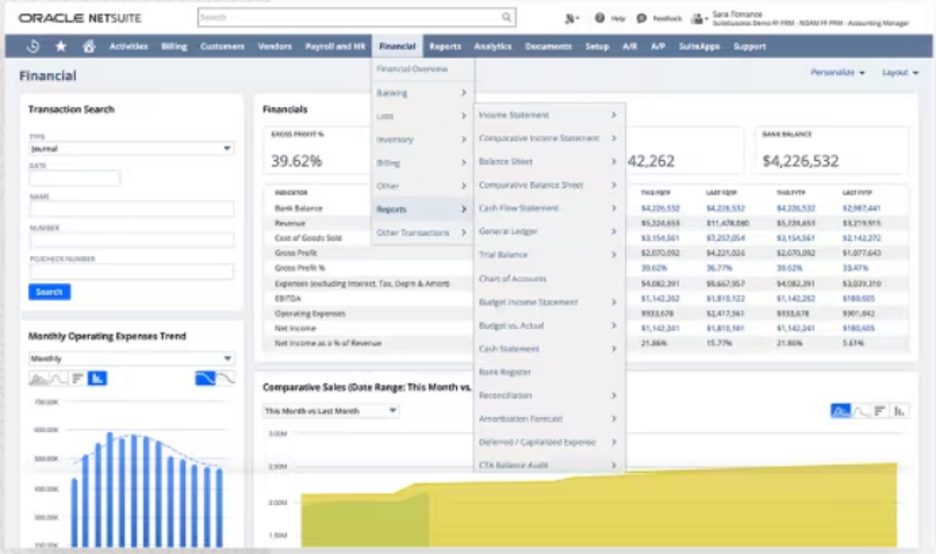
Oracle NetSuite helps businesses gain real-time insights into numerous financial metrics. Source: Oracle NetSuite
Pros
- NetSuite uses modular pricing, so you pay only for what you need.
- The software is ideal for operations on a global scale, making it a great choice for small businesses rapidly scaling into midsize or large businesses.
- NetSuite is a widely recognized ERP brand, with more than 37,000 businesses worldwide using the software.
Cons
- The high price point and steep learning curve are more appropriate for businesses with substantial resources at their disposal than small companies.
- There is no free trial.
- Potential customers must contact Oracle NetSuite directly for a price quote.
Ease of Use
Oracle NetSuite is an integrated software solution for managing finance, HR, sales, marketing and supply chain. Our testing confirmed that NetSuite’s capabilities exceed those of basic accounting and bookkeeping software. In fact, we found NetSuite far more complex than some of the mass-market accounting solutions we reviewed, including QuickBooks Online. (Read our review of QuickBooks Online to learn more.)
Like most accounting platforms we tried, NetSuite displays key business metrics on its main dashboard (see below). It’s a very busy interface packed with tools and drop-down menus. While NetSuite’s ease of use might eclipse that of other ERP solutions, it isn’t as user-friendly as basic solutions geared toward small business accounting.
NetSuite’s complexity means that many business owners may need to consider hiring a consultant to help them navigate the software and fully use its capabilities. That said, the steep learning curve belies extremely powerful tools and capabilities you won’t get with less expensive alternatives.
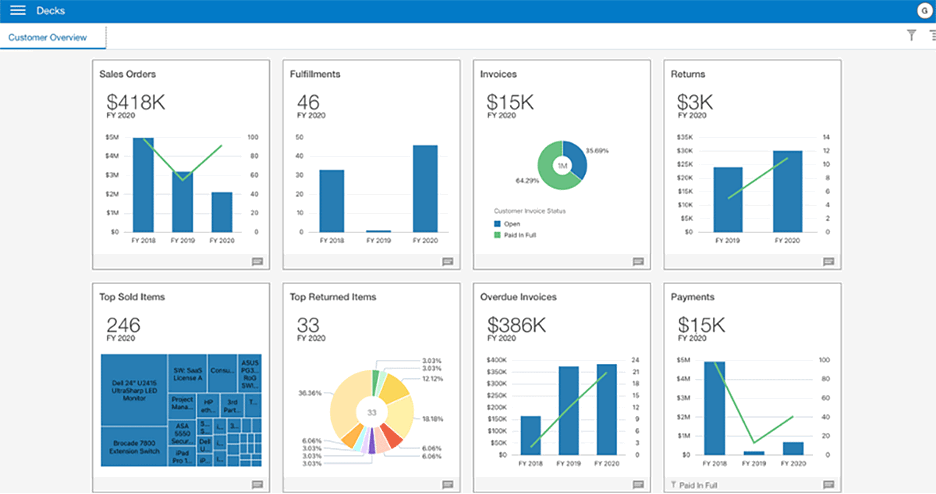
The Oracle NetSuite dashboard provides an overview of your company’s key performance indicators (KPIs). Source: Oracle NetSuite
Oracle NetSuite Features
Oracle NetSuite goes beyond essential accounting software features. If you plan to use NetSuite as part of a larger ERP solution, you can integrate your accounting processes with other functions, such as inventory management, for a complete view of your business’s income and expenses. Here is an overview of the most important features we uncovered when testing NetSuite’s accounting solution.
Financial Process and Operations Management
We were impressed with how NetSuite helps businesses design and implement financial processes with its accounting software. This solution can connect accounting functions seamlessly with management systems. Managers have real-time access to their financial data, allowing them to create reports or address delays.
The accounting software’s general ledger allows organizations to input and monitor all financial data in a customizable ledger. Users can report functionality, enhance audit trails and create support for new management through the general ledger.
Furthermore, we like how NetSuite’s accounts payable and receivable features integrate all financial data into an easy-to-use system that functions automatically. There are also management programs for taxes, fixed assets, cash and payments. [Read related article: What Are Assets in Accounting and Business?]
Billing
NetSuite’s billing features are more robust than those of many competitors we reviewed. For example, NetSuite can streamline your billing infrastructure if you have multiple clients, vendors or partners. The platform gives you control and flexibility over your billing process through a centralized framework that includes transactions, subscriptions and projects – everything goes directly to the billing engine. The billing function also allows you to create and manage subscriptions and recurring billing.
One new billing feature we especially liked during our testing is the ability to upload vendor bills. The software scans the document and extracts the data, eliminating the need to manually input bill details.
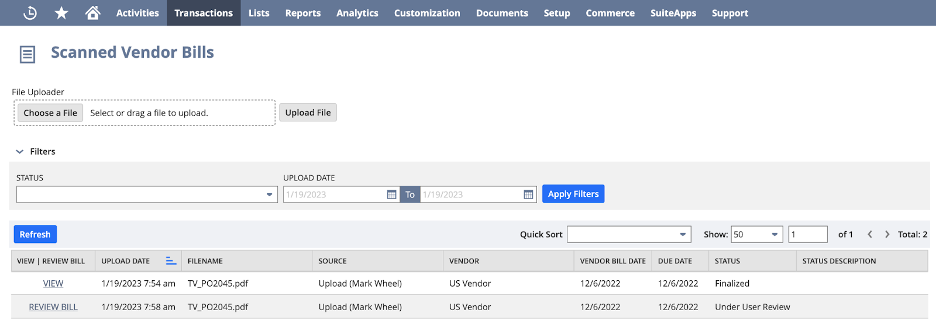
NetSuite allows you to upload vendor bills, so you don’t have to input bill details manually. Source: NetSuite
Revenue Recognition
We appreciate that NetSuite helps you comply with accounting standards to report financial results promptly. The revenue recognition services let you swiftly schedule, calculate and report revenue on financial statements. [Learn how revenue differs from income.]
Financial Planning and Reporting
Big data analysis informs NetSuite’s financial planning and reporting capabilities. We found it valuable that NetSuite can help with budget planning via its built-in planning and budgeting functions. One particularly cool aspect is that NetSuite can use your business’s data to forecast revenue and what-if scenarios and produce budgets. The system can also take your current data in future projections and generate reports.
Global Account Management and Consolidation
We like that NetSuite can help if you’re expanding your business globally. Running your business internationally or introducing your products and services into an international market can present accounting challenges. Through NetSuite’s financial engine, you can manage your business’s finances across your organization regardless of where operations take place. We noticed that the software comes with multiple language interfaces that can help you bridge communication or language gaps.
NetSuite also offers a multicurrency management system that supports more than 190 currencies. The software calculates the exchange rate automatically for real-time conversion. It also provides various payment options to resolve international transactions seamlessly.
When expanding your company internationally, be aware of international etiquette so you can conduct business respectfully and efficiently.
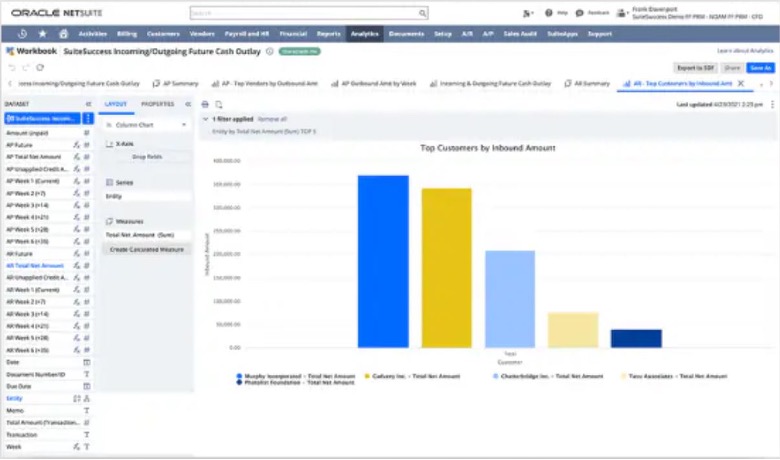
Oracle NetSuite streamlines many business processes, from A/P and A/R to inventory management. Source: Oracle NetSuite
Governance, Risk and Compliance
We were impressed that NetSuite helps organizations set up and monitor their systems to comply with regulations and meet HR compliance challenges. You can change systems as your company scales. Additionally, it’s audit ready, so any financial issues can easily be viewed and investigated. NetSuite complies with key regulatory requirements, such as ASC 606, Generally Accepted Accounting Principles (GAAP) and SOX.
The software can also transform your governance, risk and compliance (GRC) program in real time by establishing a sustainable risk management and compliance process. This feature can save businesses money in the long run, as it can predict significant issues.
Integrations
As an ERP platform, Oracle NetSuite offers seamless integration with all NetSuite modules – such as accounting, inventory management, customer relationship management (CRM) and human capital management – available on the platform. NetSuite also integrates with many leading third-party business software products and offers open APIs for new custom integrations.
Most recently, NetSuite added several new features for Amazon and Shopify users. Shopify payments now reconcile with NetSuite, eliminating the need for manual reconciliation. NetSuite users can also purchase shipping labels directly from Amazon, which we think greatly simplifies the fulfillment process.
We were impressed that a dedicated implementation team is available (albeit for an additional fee) to integrate NetSuite with your other business software. These experts can also develop additional integrations and project management planning.
Oracle NetSuite CRM is part of the larger NetSuite business ecosystem. It’s an integrated customer relationship management solution with ERP capabilities. Learn more by reading our in-depth Oracle NetSuite CRM review.
Warehouse Management
Not every accounting software competitor we reviewed has warehouse management features, so we were impressed by NetSuite’s offerings. Its warehouse management and fulfillment module is a unique feature that helps businesses control inbound logistics, outbound logistics and other aspects of inventory management. Using NetSuite, businesses can generate and send purchase orders to their suppliers. They can also send high-priority tickets to an “expedite” list for faster processing.
The outbound logistics feature tracks goods leaving the warehouse and ships directly to stores or consumers. This tool includes a “pick, pack and ship” feature, which informs warehouse and distribution employees that a product is ready for transport. As an item moves through the warehouse, NetSuite updates its records to reflect the accurate number of items remaining in your inventory.
“Supply chain distribution” and “logistics” mean two different things, although the terms are often used interchangeably. Logistics is the process of planning how products will get to their destinations, whereas distribution is the actual process of getting them there.
Inventory Tracking
Logistics tools depend on accurate inventory management, which incorporates barcoding, batch tracking and serial tracking to determine where items are located in a warehouse. We were especially impressed by how seamlessly NetSuite handles inventory tracking. When employees scan a received product into the storage facility, they move it from the loading dock to the appropriate lot, aisle and bin. Once placed, an item is scanned again, and NetSuite updates its records automatically with the item’s location and the date and time it was scanned.
Inventory Auditing
We were equally impressed by NetSuite’s inventory auditing features. Once an item is stored in the warehouse, NetSuite regularly alerts staff to perform “cycle counts,” or inventory audits. These audits reconcile the actual stock quantity in storage with the records maintained by the program’s inventory-tracking tool. The auditing features are also designed to streamline inventory audits by cataloging products based on their value, quantity and specific characteristics, such as color, size, material and type.
Order Management
The order management tool helps warehouses ensure an adequate quantity of each item is always on hand without over-ordering and ending up with dead stock – products that cannot be sold promptly. We love how NetSuite automatically analyzes historical sales and logistics data to determine optimal reordering points for each product, replenishing stock to an optimal threshold when it runs low. We also like that the system accounts for lead times identified through the inbound logistics tools, factoring in how long it takes suppliers to fulfill new orders and adjusting the minimum quantity accordingly.
We especially like some of the new improvements to NetSuite Ship Central. You can use the Ship Central module to discover optimal shipping rates, create international shipping and return labels, and execute sophisticated weight cost calculations using your company’s average values and carton weights.
Multiple-Location Management
We also appreciated NetSuite’s multilocation management tool, which we found helpful for warehouse management and tracking warehouse KPIs. Through lot tracking, bin tracking and serial tracking, you can monitor the flow of goods across your entire business in real time. NetSuite adjusts optimal stock levels automatically to support demand across all your locations.
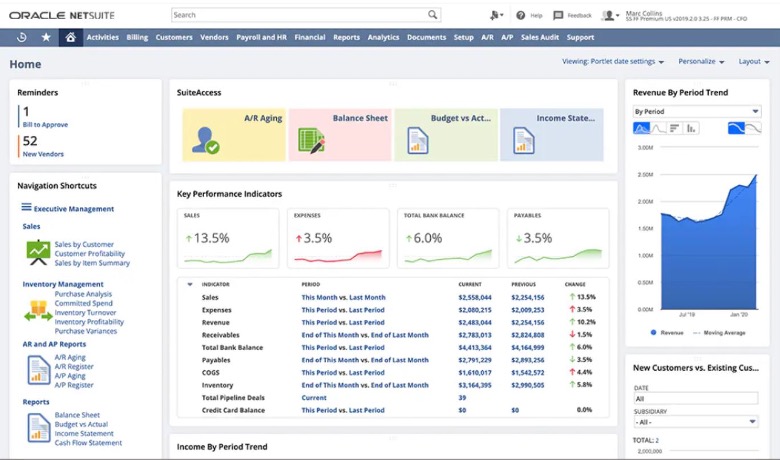
With NetSuite’s dashboards, you can access a massive amount of real-time data on your business. Source: Oracle NetSuite
Mobile App
NetSuite offers a mobile app for Apple and Android smartphones, allowing you to take your business on the go. Features include the ability to create and customize records, track expenses and time, manage your calendar, and approve sales orders and expense reports. However, the NetSuite app scores only a 2 out of 5 on Google Play and a 2.3 out of 5 on Apple’s App Store. These numbers are lower than other accounting software apps we reviewed, which makes this a weak point for NetSuite.
Oracle NetSuite Pricing
Oracle NetSuite’s ERP platform consists of financial management, inventory management, point-of-sale, CRM and employee management software. Depending on the specifics of your business, such as its size, revenue and the modules you require, the total price can vary significantly.
To get an accurate price estimate, you must speak with an Oracle sales representative. They’ll prepare a custom quote based on your company size, industry and specific needs. Based on our research, the platform starts at approximately $99 per user per month, plus a $999 monthly licensing fee. While this base price can be used as an estimate, your costs may vary significantly. Various sources provide price ranges of approximately $30,000 to over $1 million annually.
Oracle NetSuite may not be the best choice for small businesses with more basic accounting and bookkeeping needs. Midsize, scaling, large and international businesses are better positioned to benefit from this ERP platform, given its range of features. If you’re running a larger company, NetSuite’s integrated ecosystem can save you time and money that would otherwise be spent acquiring and integrating a hodgepodge of software solutions from various vendors.
If you’re in the market for a less expensive accounting software solution that can grow with your business, check out our review of Xero. Xero is well suited for growing companies.
Implementation and Onboarding
During our investigation into NetSuite, we found that onboarding isn’t the simplest process. As with pricing, you must contact the company’s sales team for a free product tour to get started. You can also view various product-specific demos on NetSuite’s website. However, unlike most other accounting software packages we examined, NetSuite does not offer a free trial.
Implementing NetSuite as a brand-new user likely won’t be a walk in the park for most business owners. An entire cottage industry of consultants exists solely to assist businesses with implementing NetSuite and tailoring it to fit their needs. Although companies that use NetSuite generally are larger and can probably absorb these extra costs, it’s something to keep in mind for anyone considering this solution. If you’re a smaller business or on a tight budget, we recommend you consider investing in a dedicated accounting platform that integrates with your other systems and tracks your finances without a steep learning curve and without breaking the bank.
Customer Support
Oracle NetSuite provides extensive customer service for all its software, including the accounting systems. It also provides educational services that help users learn about the program and get up to speed on new features or product versions. These services come in the form of both documents and online classes.
Real-time support for industries as well as individual users is available 24/7. The chatbot on NetSuite’s website can provide users with simple explanations or connect them with a customer service representative.
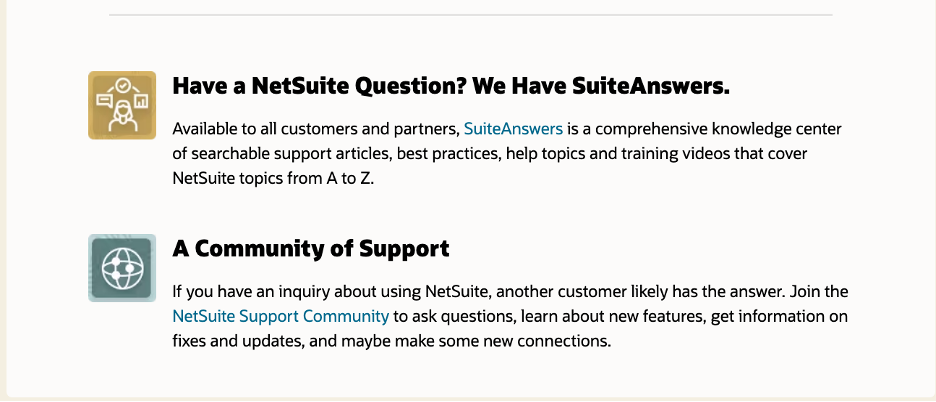
NetSuite’s online support resources include a searchable knowledge center and a community support forum. Source: Oracle NetSuite
Limitations
With such a comprehensive set of features, Oracle NetSuite’s primary limitation is not so much the software itself. In our view, the drawbacks are its high price point and steep learning curve.
Implementation will likely take a very long time; in fact, it may take months or years to master the platform and its abilities. It is not the most user-friendly system despite an extensive feature set. This means NetSuite is not an appropriate choice for small businesses with limited resources. However, it’s an excellent option for established companies with vast resources.
Small business owners with less complex needs might want to check out lower-priced alternatives for their accounting and bookkeeping needs. Our FreshBooks review revealed that this software is great for handling professional invoicing, and our review of Zoho Books demonstrated it to be a fantastic tool for automating accounting processes.
Methodology
We researched and analyzed dozens of the best accounting and invoicing software solutions to help small businesses find the right accounting software for their needs. To generate our quantitative score and use case, we reviewed software features like payment and invoicing capabilities, integrations, mobile apps, report generation, supported user count, and customer service. We also assessed pricing and the availability of free trials. We gathered information from company websites and test sessions, and we weighed customer testimonials on the software’s pros and cons.
When looking for the best accounting software with ERP tools specifically, we focused on how product breadth creates a unified system to help businesses meet complex operational challenges. We considered the features that go beyond traditional accounting functions to allow for holistic enterprise resource planning. You can read more about our editorial process here.
FAQ
Oracle NetSuite is an ERP platform with numerous modules to manage financials, HR, inventory, supply chains and more.
The Oracle Corporation acquired NetSuite in 2016; its software package is now formally known as Oracle NetSuite.
Oracle NetSuite doesn’t provide pricing upfront. Potential customers must contact Oracle for a quote, although $99 per user per month, plus a $999 monthly licensing fee, is a ballpark figure.
Bottom Line
We recommend Oracle NetSuite for …
- Organizations looking for a platform that combines accounting functionality with other business tools.
- Growing midsize or large businesses (or small businesses making that transition) that require a powerful, all-in-one ERP solution.
- Businesses with the resources to support Oracle NetSuite beyond its monthly costs, such as consultants to assist with training and implementation.
We don’t recommend Oracle NetSuite for …
- Companies looking for basic accounting software.
- Small businesses without the resources or budget to accommodate NetSuite.
- Businesses that want to avoid the steep learning curve that comes with a complex but powerful solution like NetSuite.

business.com
Looking for more options?
Check out The Best Accounting and Invoice-Generating Software for 2024 business.com recommends.
